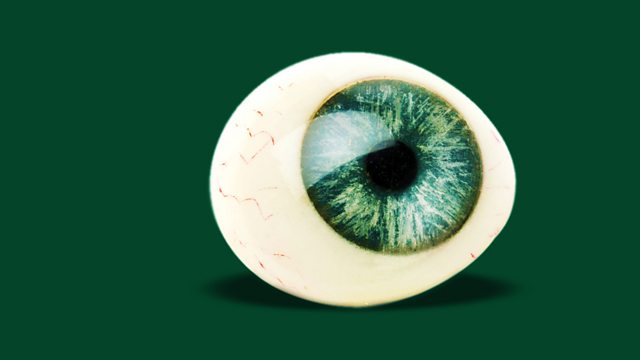The Unseeing Eye
Britain's last glass eye maker is retiring. Most prosthetic eyes now are acrylic. Jolyon Jenkins explores the world of false eyes.
Jost Haas is the last glass eye maker left in Britain, and he is close to retirement. He comes from Germany, where glass eye technology was perfected nearly 200 years ago. Nowadays prosthetic eyes are acrylic and the skill of the glass eye blower is not needed. But some wearers still prefer glass to plastic, and those who have been with Mr Haas for decades are stocking up against the time when he finally turns off his Bunsen burner.
In this programme Jolyon Jenkins explores the world of the prosthetic eye. Unlike, say, an artificial leg, or a false tooth, the artificial eye brings no direct benefit to its wearer. It exists to make other people feel comfortable with eyeless person. Some one-eyed people rebel against wearing a prosthesis, but most fall into line, uncomfortable themselves with the reaction an eyeless face provokes.
For others, being fitted with a false eye, after an accident or illness, is a highly emotional moment. One man describes how he cried as he saw his face in the mirror with the prosthesis fitted for the first time. Another woman describes how she didn't want a false eye but wanted the eyelid stitched down. "I had the thought that if eyes are the windows to the soul I had lost half my soul."
Although the "windows to the soul" saying is a clichΓ© that many false eye-wearers dislike there is, remarkably, evidence that eyes really do correlate with character. A Swedish study suggests that patterns in the iris can predict such things as warmth, trust, and impulsiveness. So someone making a glass eye is, in a sense, constructing an image of the soul.
In the programme, Jolyon sits in on glass eye fittings and speaks to the skilled artists who paint acrylic eyes; he talks to artificial eye wearers and attends a meeting of one-eyed people.
Last on
Broadcast
- Fri 24 Feb 2012 11:00Βι¶ΉΤΌΕΔ Radio 4

